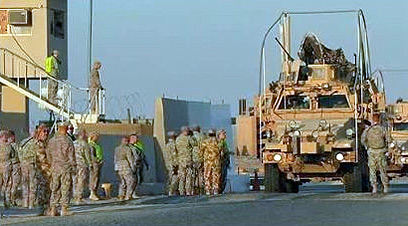

The last convoy of US soldiers pulled out of Iraq on Sunday, ending nearly nine years of war that cost almost 4,500 American and tens of thousands of Iraqi lives and left a country still grappling with political uncertainty.
The war launched in March 2003 with missiles striking Baghdad to oust Dictator Saddam Hussein closes with a fragile democracy still facing insurgents, sectarian tensions and the challenge of defining its place in the Arab region.
The final column of around 100 mostly US military MRAP armored vehicles carrying 500 US troops trundled across the southern Iraq desert through the night along an empty highway and across the Kuwaiti border.
Honking their horns, the last batch of around 25 American military trucks and tractor trailers carrying Bradley fighting vehicles crossed the border early on Sunday, their crews waving at fellow troops along the route.
"I just can't wait to call my wife and kids and let them know I am safe," Rodolfo Ruiz said as the border came into sight. Soon afterwards, he told his men the mission was over, "Hey guys, you made it."
For President Barack Obama, the military pullout is the fulfillment of an election promise to bring troops home from a conflict inherited from his predecessor, the most unpopular war since Vietnam and one that tainted America's standing worldwide.

Going Home for Christmas (Photo: Reuters)
For Iraqis, the US departure brings a sense of sovereignty but feeds nagging fears their country may slide once again into the kind of sectarian violence that killed thousands of people at its peak in 2006-2007.
Prime Minister Nuri al-Maliki's Shiite-led government still struggles with a delicate power-sharing arrangement between Shiite, Kurdish and Sunni parties, leaving Iraq vulnerable to meddling by Sunni Arab nations and Shi'ite Iran.
Iraq says its forces can contain the violence but they lack capabilities in areas such as air defense and intelligence gathering. A deal for several thousand US troops to stay on as trainers fell apart over the sensitive issue of legal immunity.
After Obama announced in October that troops would come home by the end of the year as scheduled, the number of US military bases was whittled down quickly as hundreds of troops and trucks carrying equipment headed south to the Kuwaiti border.
At the height of the war, more than 170,000 US troops were in Iraq at more than 500 bases. By Saturday, there were fewer than 3,000 troops, and one base.
The last troops flicked on the lights studding their MRAP vehicles and stacked flak jackets and helmets in neat piles, ready for the final departure for Kuwait and then home.
US and foreign companies are already helping Iraq develop the vast potential of the world's fourth-largest oil reserves, but its economy needs investment in all sectors, from hospitals to infrastructure.
Iran and Turkey, major investors in Iraq, will be watching with Gulf nations to see how it handles its sectarian and ethnic tensions, as the crisis in neighboring Syria threatens to spill over its borders.
- Receive Ynetnews updates
directly to your desktop















